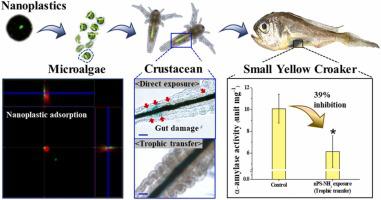Journal of Hazardous Materials ( IF 13.6 ) Pub Date : 2022-08-04 , DOI: 10.1016/j.jhazmat.2022.129715 Lia Kim 1 , Rongxue Cui 1 , Jin Il Kwak 1 , Youn-Joo An 1

|
This study investigated the effects of nanoplastics on marine organisms via trophic transfer in the food chain. We designed a three-step food chain comprising microalga (Dunaliella salina), small crustaceans (Artemia franciscana), and fish (small yellow croakers; Larimichthys polyactis) and evaluated the effects of trophic transfer in marine organisms, as well as verified the possibility of nanoplastic transfer to humans via trophic transfer. Using amine-modified nanopolystyrene (nPS-NH2) as a pollutant, we conducted both direct-exposure and trophic transfer experiments to determine how pollutants move through the food chain (D. salina → A. franciscana). Exposure of D. salina to nPS-NH2, which was adsorbed on its cell wall, resulted in transfer to A. franciscana with alteration of gut permeability. Additionally, assessment of the adverse effects of nPS-NH2 via a dietary pathway (three-step food chain) on the L. polyactis digestive system revealed that nanoplastics adsorbed to the cell wall of microalgae are gradually transferred to higher trophic level organisms, such as via food resources consumed by humans, inducing the inhibition of digestive enzyme activity (α-amylase). It indicates that human could eventually be exposed to nanoplastics and experience toxicity.
中文翻译:

纳米塑料通过微藻-甲壳类-小黄鱼食物链的营养转移:抑制鱼类的消化酶活性
本研究通过食物链中的营养转移研究了纳米塑料对海洋生物的影响。我们设计了一个由微藻( Dunaliella salina)、小型甲壳类动物(Artemia franciscana)和鱼类(小黄鱼;Larimichthys polyactis )组成的三步食物链,并评估了营养转移对海洋生物的影响,并验证了纳米塑料通过营养转移传递给人类。使用胺改性纳米聚苯乙烯 (nPS-NH 2 ) 作为污染物,我们进行了直接暴露和营养转移实验,以确定污染物如何通过食物链 ( D. salina → A. franciscana )。的接触D. salina到吸附在其细胞壁上的nPS-NH 2导致转移到A. franciscana并改变肠道通透性。此外,通过膳食途径(三步食物链)评估 nPS-NH 2对多聚乳酸杆菌消化系统的不利影响表明,吸附在微藻细胞壁上的纳米塑料逐渐转移到更高营养水平的生物体中,例如如通过人类消耗的食物资源,诱导消化酶活性(α-淀粉酶)的抑制。这表明人类最终可能会接触到纳米塑料并经历毒性。


























 京公网安备 11010802027423号
京公网安备 11010802027423号